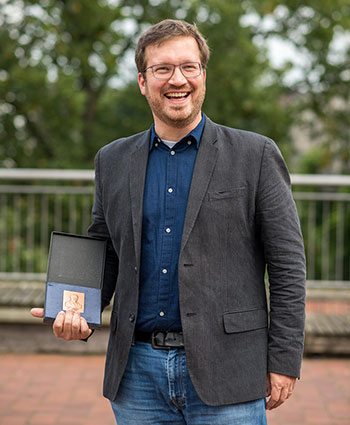27.09.17 | During its GeoBremen 2017 conference at the University of Bremen the „Deutsche Geologische Gesellschaft – Geologische Vereinigung (DGGV)“ awarded the Hermann Credner Prize to Dr. Nils Moosdorf from the Leibniz Centre for Tropical Marine Research (ZMT). The 37-year-old has received the accolade in recognition of his research in the field of submarine groundwater discharge and global biogeochemical cycles. Now endowed with 5000 Euro, the Hermann Credner Prize for young scientists (under the age of 40) has been awarded annually since 1960.
„The DGGV honours an exceptional and innovative young scientist, who has already gained an international reputation in his filed,” said Professor Jan Behrmann, President of the DGGV at the awards ceremony.
Since his dissertation Nils Moosdorf has studied the role of rocks in the global cycling of carbon, silicon or phosphor. Furthermore, Moosdorf investigated whether artificially accelerated rock weathering could contribute to reducing the CO2 concentration in the atmosphere. Due to his findings geo sciences is now better equipped to better understand today‘s biogeochemical cycles and to understand their past and future changes.
As head of a junior research group at ZMT Nils Moosdorf currently studies the role of direct groundwater discharge into the ocean in local and global land-ocean solute fluxes. For his research he not only relies on his own field studies in South East Asia or Tahiti but also uses large data sets from publicised studies, in order to find new aspects within the data. Local knowledge about fresh water discharge are also an important source of information for him.
In her laudation, Professor Hildegard Westphal, Scientific Director of ZMT, described Moosdorf as a „scientist who crosses borders and who connects the studies of land and water across disciplinary boundaries“. „Nutrient transport with groundwater not only influences marine ecosystems but can also have potential effects on the maritime economy“, said Westphal. „Yet, invisible connection underground is seldom studied in detail. Not many researchers are looking at the land and are thinking of the sea.“
In his work group Moosdorf unites geologists and hydrologists as well as biologists and mineralogists and sees the chance for new findings in crossing disciplinary boundaries. „He is a representative of a new generation of scientists who want to comprehend our changing world in its wider dynamic – an understanding of science that the DGGV honours today with the Hermann Credner Prize,“ Westphal continued.
For Nils Moosdorf the award is an important acknowledgement in his young scientific career. „I am very happy about this honour and would not only like to thank the DGGV but also in particular those colleagues who taught me so much in lively discussions. Scientific exchange has always been and will continue to be exciting and inspiring for me.”





